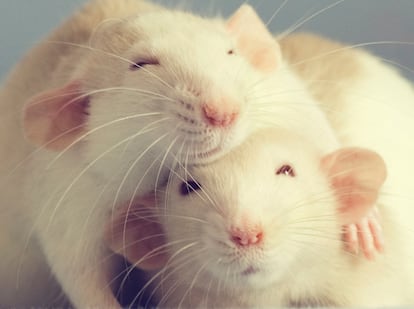Do animals have a sense of humor? This scientist has been tickling rats for years to prove it
Neuroscientist Michael Brecht published a study in which he describes a basic brain area that is activated when rodents play, suggesting that playful behavior is an instinct

On a normal work day, neuroscientist Michael Brecht enters his lab at Humboldt University in Berlin, puts on his lab coat and starts tickling his rats. It’s a fun job — especially for the rats — but also serious. Brecht leads a research team that aims to identify the part of the brain responsible for laughter and play. This would be located in the periaqueductal gray matter, a cluster of neurons located around the midbrain, according to a study published this week in the journal Neuron.
It’s the same area of the brain that controls sounds and the fight-or-flight response (which is also activated by physical play). “We know that vocalizations such as laughter are very important in the game,” explains Brecht by video call, “that’s why we search in that area.” When we play, laughter coordinates and directs the process. It serves as an acknowledgement of humorous intentionality. It marks the difference between a fight and a game. It’s what turns a politically incorrect comment into a joke, as well as the contextual backdrop that disarms a threat.
This also happens with rats. They laugh, in their own way. They emit ultrasonic vocalizations of 50 kilohertz when they are playing or being tickled. But they only do so if they have some complicity with the scientists. So, Brecht and his team needed a period of adaptation with the rodents, and only then did they start tickling them with their fingers on their backs and tummies. They then measured their squeaks and their brain activity. And they discovered strong neural responses to both tickling and play in the lateral column of the periaqueductal gray.
Playfulness as an instinct
“We had already observed that playing a game activated some of the high-level structures of the sensory cortex,” explains the scientist. “But in this new study, we chose to look at a more basic brain structure and saw that, even by inhibiting the high-level brain structures, animals can still play.” This would show that playful behavior is a basic mechanism, that it is an instinct.
Humor is one of the least understood and studied animal behaviors, Brecht assures. “I think there has been a bias against studying it scientifically,” he says. “Most studies focus on understanding negative emotions such as depression, anxiety, pain... And I have nothing against it, but positive emotions are also an important part of life,” he reflects. That’s why he has insisted on tickling rats.
Playfulness and humor are a trait common to many mammals. Dogs, meerkats and rats laugh. Apes do it too. In fact, our laughter is supposed to be an evolution of the characteristic panting that great apes do when playing. Psychologist Marina Davila-Ross, from the University of Portsmouth (U.K.), analyzed digital recordings of tickle-induced gasps from chimpanzees, bonobos, gorillas and orangutans and found that vocal similarities between the species matched their evolutionary relationships. Chimpanzees and bonobos, our closest relatives, have the most human-like laughter.
Caleb Warren, co-director of the Humor Research Laboratory at the University of Colorado, has been studying what makes things funny for 15 years. And the conclusions he’s reached, with humans, are not unlike those Brecht has compiled with rats. “People laugh at a disruption of the status quo,” he notes in a videoconference. “When they perceive a transgression, but, at the same time, they think that it is innocuous, that it has no major consequences,” he explains. Warren developed this idea in the study Benign Aggressions: Making Immoral Behavior Funny.
This theory could help to explain concepts as abstract as the limits of black humor and political correctness. But also something much more basic and primitive, like tickling. “[Tickling is a] physical attack, but exercised in a way that doesn’t hurt. And [it comes] from a person you trust,” he explains. “Try tickling yourself: it doesn’t work, there’s no threat. If a weird guy on the street comes up to you and tries to tickle you, that’s not funny either, it’s rather disturbing. In that case, there would be a transgression.”
Laughter can thus be understood as a primitive form of communication. “It’s one of the few sounds we use to communicate before we speak, other than crying and screaming,” Warren says. “It predates language in humans. And other animals laugh, but they have no verbal language. So it was probably communicating something very important.”
Brecht does not know if the noise that rats make could be considered laughter, but what it does have in common with laughter is that it is an unmistakable sign of happiness. This fact could be used to test the effectiveness of antidepressants in rodents, or to understand how stress can affect our mood. The ultrasonic laughter of rats can help us understand a lot about the mechanisms of playfulness and our moods.
Sign up for our weekly newsletter to get more English-language news coverage from EL PAÍS USA Edition
Tu suscripción se está usando en otro dispositivo
¿Quieres añadir otro usuario a tu suscripción?
Si continúas leyendo en este dispositivo, no se podrá leer en el otro.
FlechaTu suscripción se está usando en otro dispositivo y solo puedes acceder a EL PAÍS desde un dispositivo a la vez.
Si quieres compartir tu cuenta, cambia tu suscripción a la modalidad Premium, así podrás añadir otro usuario. Cada uno accederá con su propia cuenta de email, lo que os permitirá personalizar vuestra experiencia en EL PAÍS.
¿Tienes una suscripción de empresa? Accede aquí para contratar más cuentas.
En el caso de no saber quién está usando tu cuenta, te recomendamos cambiar tu contraseña aquí.
Si decides continuar compartiendo tu cuenta, este mensaje se mostrará en tu dispositivo y en el de la otra persona que está usando tu cuenta de forma indefinida, afectando a tu experiencia de lectura. Puedes consultar aquí los términos y condiciones de la suscripción digital.









































